Do you think law school sounds challenging? Wait until you discover how many hours lawyers actually work in practice. While most professionals enjoy regular office schedules of around 40 hours per week, the legal profession operates by a different set of rules—where long hours are the norm and a healthy work-life balance often feels out of reach.
This isn’t surprising in the legal field. Between managing cases, preparing documents, meeting deadlines, and serving clients, lawyers face a workload that demands constant attention.
Even with years of experience and continuing education, lawyers are still vulnerable to stress and burnout. The Bloomberg Law 2024 Attorney Well-Being Report found that 52% of private practice and in-house lawyers report experiencing burnout due to overwhelming workloads and long hours. The biggest contributor? The constant pressure to maximize billable time, often at the expense of personal well-being.
It’s easy to see why so many lawyers feel exhausted and strained both professionally and personally. Whether you're considering law school, currently in private practice seeking better work life balance, or curious about the legal profession, understanding the reality of how many hours lawyers actually work is crucial.
This guide reveals the truth behind the legal industry’s time demands and offers practical strategies to manage workloads and find balance, without sacrificing your personal life.
Key Takeaways
- Lawyers at large law firms work the longest hours, averaging 66 hours per week.
- Lawyers at government agencies have the fewest hours, averaging a standard 40 hours per week.
- A lawyer’s working hours are influenced by factors such as firm size, practice area, client demands, and billable hour requirements.
- Corporate law is the practice area with the longest working hours, often requiring lawyers to work 60–80+ hours per week during peak periods.
How Many Hours a Week Do Lawyers Work?
While some lawyers manage to work around 40 hours per week, the vast majority routinely put in extended hours. The latest industry data from the U.S. Bureau of Labor Statistics show that a lawyer’s weekly working hours is largely influenced by the size and type of their practice.
Below is a table of the current average hours lawyers work per week:
Lawyers at large firms work the longest hours, averaging about 66 per week, while those in government agencies work the fewest at around 40. Overall, the average lawyer typically works between 45 and 55 hours per week.
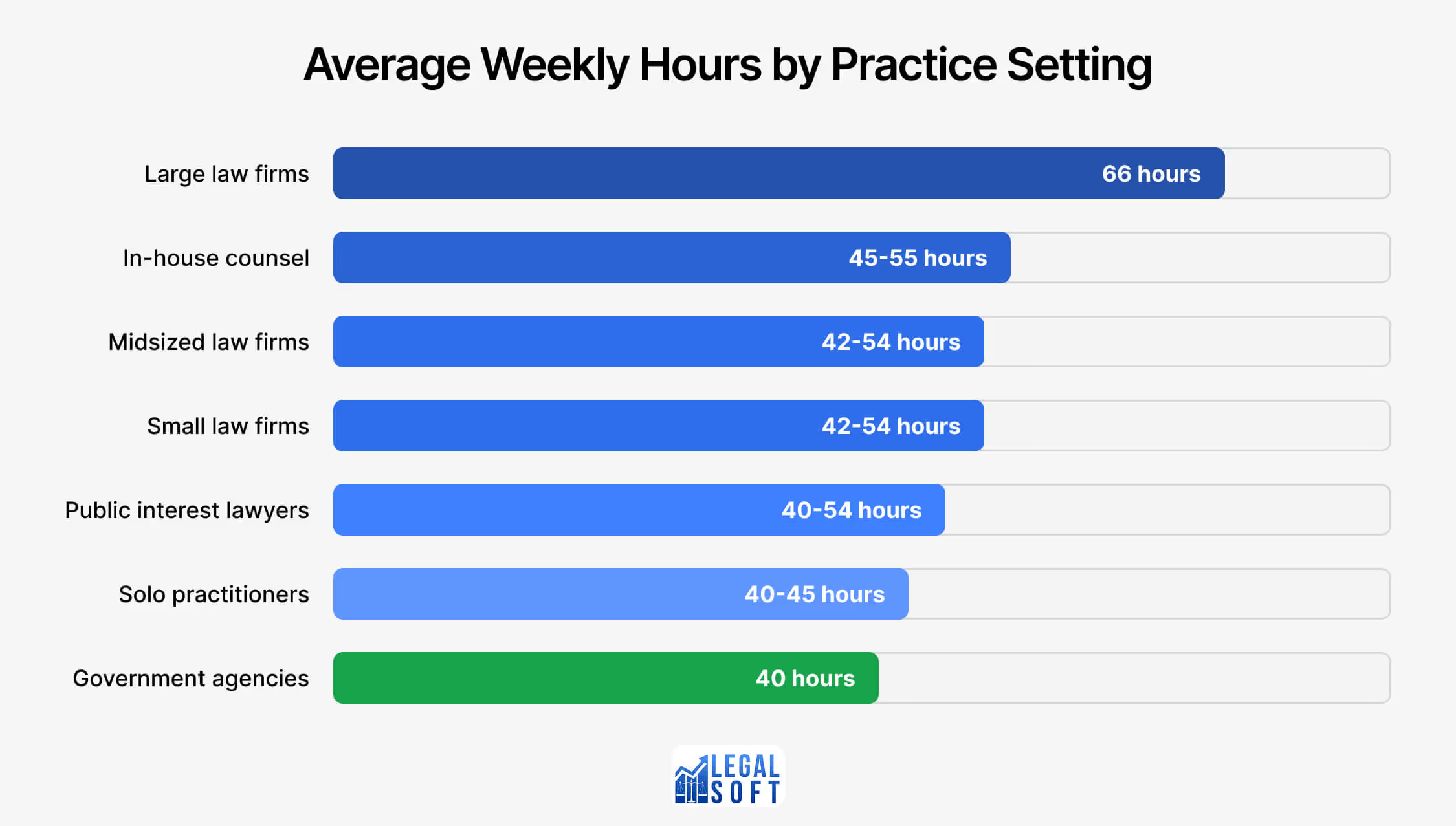
Why Lawyers Work So Many Hours: The Billable Hour System
Understanding why exactly how many hours lawyers work requires grasping the billable hour system that governs most legal careers. This system is the primary driver behind why lawyers report working such extended work hours.
Billable hours represent time directly spent on client-related work, such as legal research, court appearances, drafting legal documents, and client meetings.
Most law firms set billable hour targets for lawyers, typically ranging from 1,700 to 2,300 hours per year. This means lawyers are under constant pressure to meet, and ideally exceed, these goals.
Billable vs. non-billable tasks
The most recent NALP data shows that the average billable hour requirement is 1,892 hours per year overall, and 1,930 hours per year at firms with more than 700 attorneys.
But here’s the catch: billable hour quotas only represent a fraction of a lawyer’s actual working time. Lawyers also spend significant hours on non-billable tasks, such as:
- Administrative work hours and internal meetings
- Business development activities
- Continuing legal education
- Email management and correspondence
- Pro bono work
- Time tracking and billing administration
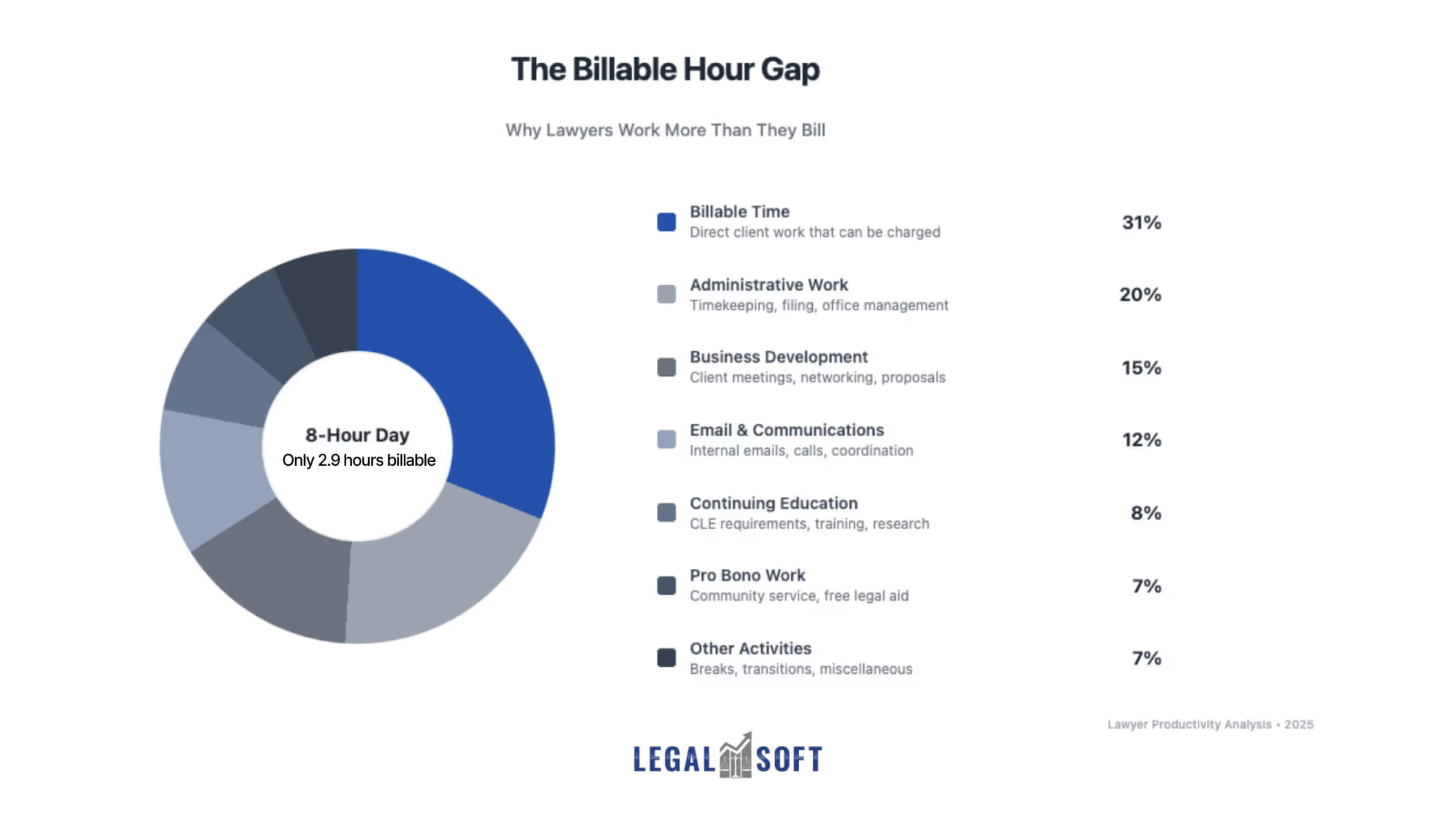
Because of these additional responsibilities, lawyers often work far more hours than their billable targets suggest. According to Clio’s 2024 Legal Trends Report, for every eight hours worked, only 2.9 are billable—leaving over five hours each day spent on non-billable tasks.
With most firms setting billable expectations of 1,700–2,300 hours per year (roughly 142–192 per month), attorneys must put in extra time to balance both billable and non-billable demands. This constant push to meet targets is one of the biggest reasons lawyers work such long hours and often struggle with maintaining work-life balance.
Factors Affecting Lawyer Working Hours
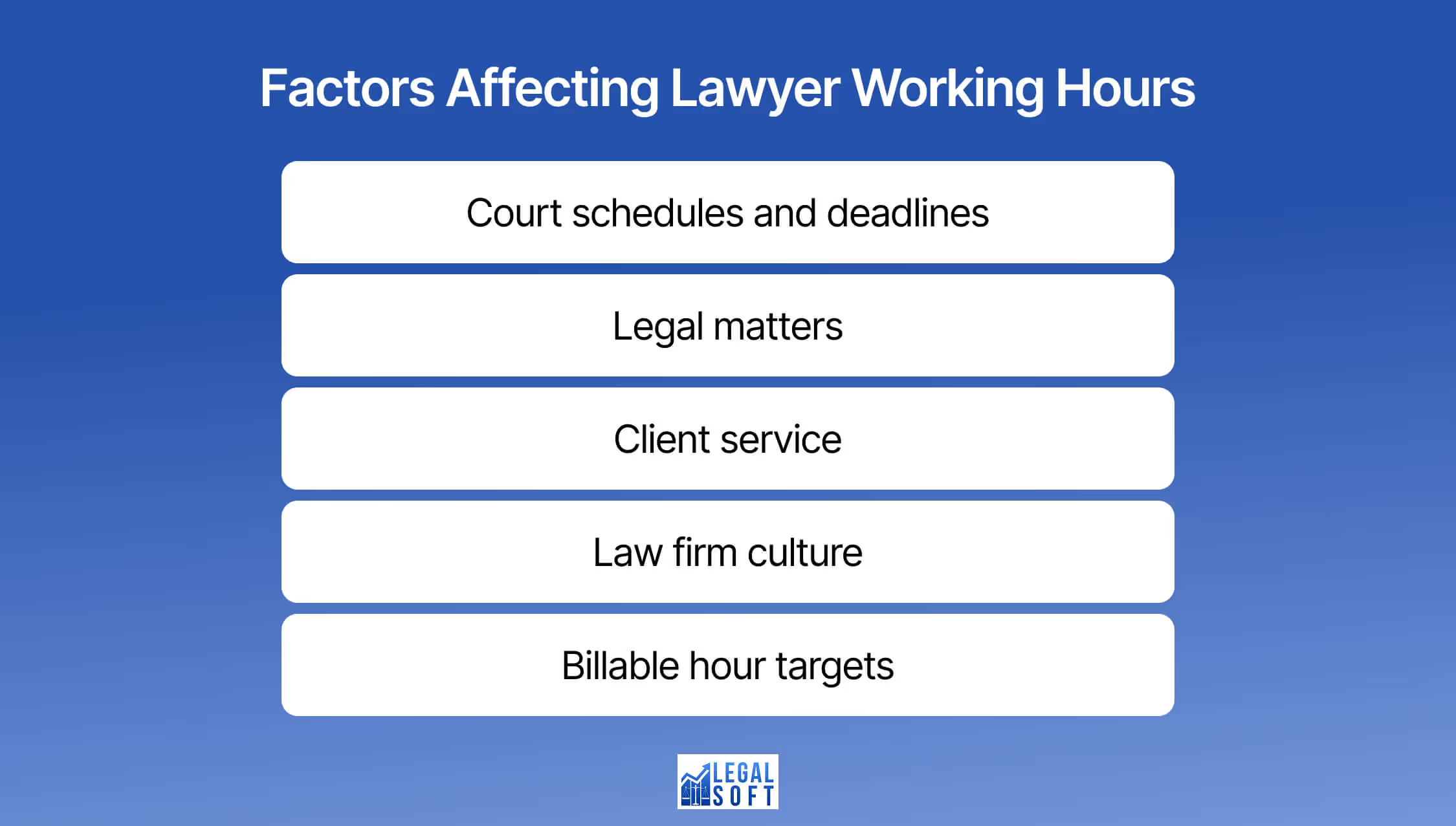
Several factors contribute to the long hours lawyers work. Understanding these pressures helps explain why many attorneys work far beyond traditional schedules.
Court schedules and deadlines
Court calendars and filing deadlines create rigid time constraints that lawyers cannot control. Unlike negotiable business deadlines, court deadlines are absolute. Missing a filing deadline can result in case dismissal, malpractice claims, and devastating consequences for clients.
Legal matters
Many legal matters involve urgent, high-stake situations requiring immediate attention. For example, a corporate law deal might involve millions of dollars and require lawyers to work long hours to close the transaction on a tight deadline. Similarly, securities law may require unpredictable work on weekends to finalize public offerings or respond to regulatory inquiries.
Client service
Lawyers often prioritize being available for their clients. According to the 2022 Legal Trends Report, 69% of lawyers are willing to communicate with clients in the evenings, and 74% are available on weekends. This "client-first" mindset directly contributes to the long hours many lawyers work.
Law firm culture
In many firms, long hours are equated with dedication and competence, creating pressure for attorneys to demonstrate commitment through visible time spent in law offices—even when the legal work doesn't require such extended work hours.
Billable hour targets
Billable hour targets add another layer of stress. Partnership tracks frequently reward lawyers who exceed billable goals and prioritize client service over personal life. This competitive environment particularly affects younger lawyers, who often feel pressured to outwork their peers to advance their careers.
Average Working Hours by Practice Setting
Working conditions vary greatly depending on the practice setting. While large firms demand the most time from their attorneys, lawyers at government agencies and in solo practice often experience more balance but come with their own challenges.
Large law firms
Lawyers at large law firms work the longest hours, averaging 66 hours per week. While these firms offer the highest salaries in the legal industry, they come with a high cost in terms of work-life balance. The pressure to bill 2,000+ hours annually, combined with non billable tasks, pushes many lawyers well beyond healthy limits.
Small and medium-sized law firms
Lawyers at small and medium-sized law firms work an average of 42-52 hours per week. These firms typically offer a better work-life balance while still providing competitive pay and engaging legal work. They tend to use technology like legal case management software more effectively to reduce the time spent on administrative tasks.
Solo practitioners
Solo lawyers work an average of 40-45 hours per week, though their schedules vary widely. Running a solo practice allows for more flexibility and control, but it also requires additional time for business management, marketing, and administrative tasks that larger firms often delegate to support staff.
In-house counsel
In-house counsel work an average of 42-55 hours per week, typically on more predictable schedules than private practice. They are more likely to keep regular business hours and face fewer weekend demands, making this path attractive to lawyers prioritizing stability and balance.
Government agencies
Lawyers at government agencies work an average of 40 hours per week, aligning with a standard business schedule. While workloads may fluctuate depending on the agency, these roles often appeal to those who value personal time over higher compensation.
Public interest lawyers
Public interest lawyers work an average of 40-50 hours per week. Although their incomes are significantly lower than private-sector lawyers, research shows they report higher levels of well-being and lower levels of stress. This is often attributed to their more sustainable schedules and the intrinsic reward of the work they do.
Lawyer Working Hours by Practice Area

Different areas of law create varying demands on attorneys' time. Some practice areas require consistently long hours, while others offer more predictable schedules.
Corporate law
Corporate lawyers often work 60-80+ hours per week, particularly during mergers and acquisitions. They face some of the most unpredictable schedules in the profession. Securities lawyers face similar demands during public offerings or regulatory compliance periods. Even in routine periods, corporate attorneys typically work extended hours handling contracts, compliance issues, and business transactions.
Intellectual property law
Intellectual property lawyers, including patent lawyers, generally work 45-60 hours per week with relatively steady workloads. Patent lawyers often work regular business hours due to the research-intensive nature of their legal work, though deadlines for patent applications can create occasional surges in hours.
Tax law
Tax lawyers average 70+ hours per week during peak filing season in March and April, then return to 45-55 hours per week for the rest of the year. Their workloads are highly seasonal, moderate for most of the year but extremely demanding during tax deadlines.
Environmental Law
Environmental attorneys typically work around 40 hours per week, with occasional increases tied to specific projects. Their schedules often follow regulatory timelines, making their hours more predictable compared to litigation or corporate practice.
Personal injury law
Personal injury lawyers average 50-65 hours per week due to high client volumes and ongoing litigation. Court schedules and emergency cases often create unpredictable hours, particularly during settlement negotiations. To manage these demands, many personal injury firms rely on support staff to ensure 24/7 client availability.
Family law
Family lawyers handling divorce and child custody cases typically work 40-55 hours per week. While hours are moderate, the emotional intensity of cases often makes workloads feel heavier. With U.S. courts handling 66 million cases annually, including nearly 3.8 million family law matters in 2024, court schedules and client emergencies often push lawyers into extended work hours.
Criminal defense law
Criminal defense lawyers work 42-66+ hours per week, with highly variable schedules dictated by court hearings, trial preparation, and client needs. Their hours are often beyond their control, driven by the pace of the court system.
Impact of Long Working Hours for Lawyers
The demanding schedules common in the legal profession extract significant personal and professional costs that extend far beyond simple fatigue. Prolonged work hours affect lawyers’ mental health, physical health, and personal relationships, with consequences that ripple across their careers and personal lives.
Well-being
According to the 2024 Attorney Well-Being Report, lawyers rated their overall well-being at an average of 6.5 out of 10. Younger attorneys (ages 25–34) reported the lowest scores at 5.6, with well-being improving with increasing age.
Other surveys highlight the widespread challenges in the legal profession:
- 55% of attorneys experience anxiety.
- 53% of female attorneys and
- 41% of male attorneys report experiencing burnout
- 56% experiencing disrupted sleep patterns.
- 44% struggle with low energy and concentration.
- 25% report issues in personal relationships.
Despite these numbers, over 70% of lawyers who need mental health support delay or avoid treatment. Their number one reason? They don’t have enough time.
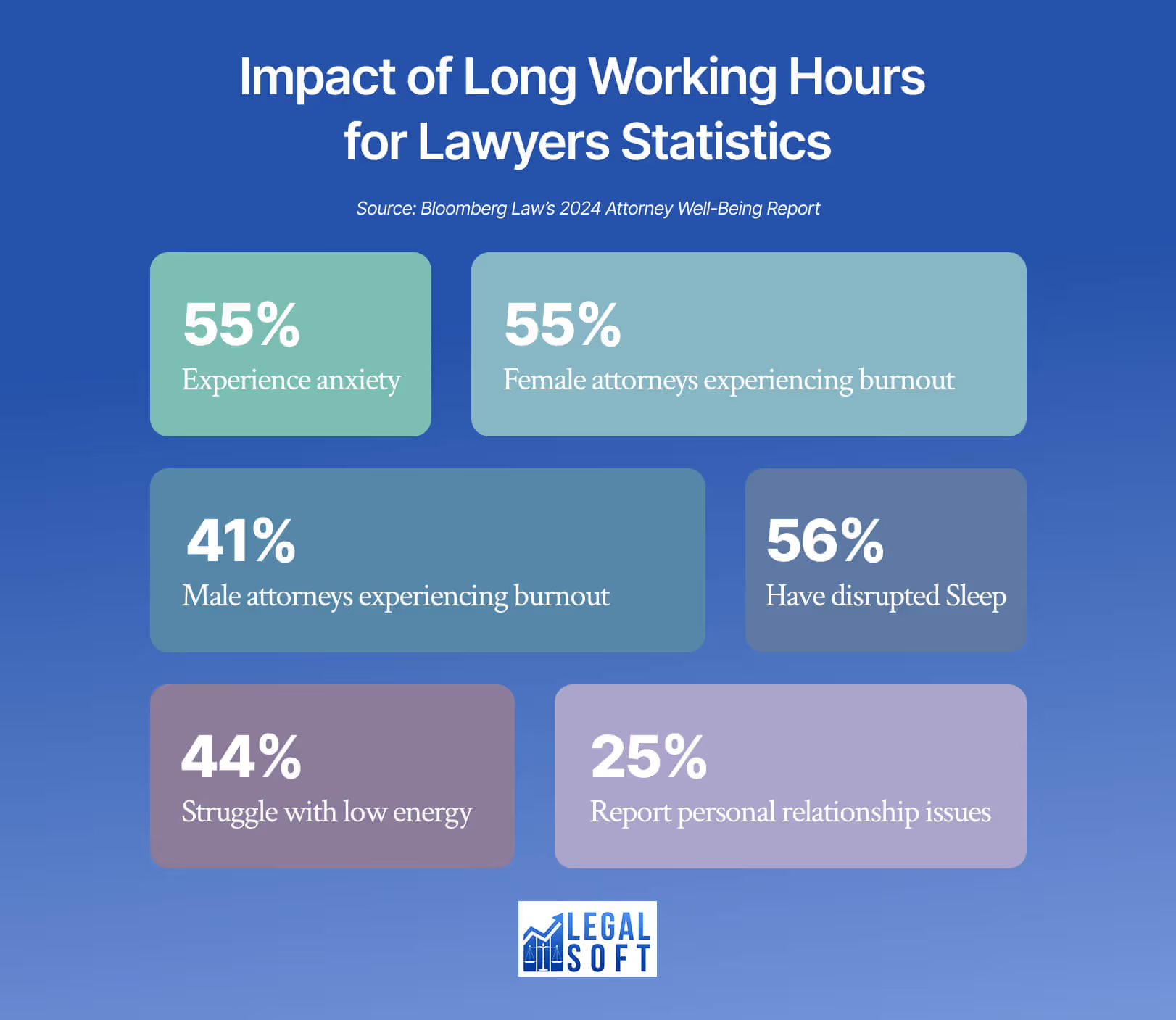
Physical health consequences
Long hours and sustained stress lead to chronic physical health problems that many attorneys experience:
- Cardiovascular problems linked to prolonged stress.
- Digestive issues from irregular meals and eating habits.
- Sleep disorders and chronic insomnia.
- Headaches and vision problems from excessive screen time.
- Musculoskeletal issues from prolonged sitting in law offices.
Many lawyers report neglecting preventive healthcare due to scheduling demands, which often results in more serious health problems down the line.
Personal life and relationship strain
Extended and unpredictable schedules often strain personal relationships. Many attorneys report difficulties maintaining friendships, marriages, and family connections. Career demands also delay major life milestones, such as starting families.
Parents in the legal profession often struggle with work-life integration, missing important family events while feeling constantly torn between professional obligations and personal life responsibilities.
Strategies to Achieve Healthy Work Life Balance as a Lawyer
The legal profession has a complicated relationship with work-life balance, but achieving it is possible. By making intentional choices and adopting the right strategies, lawyers can build successful careers without sacrificing their personal well-being.
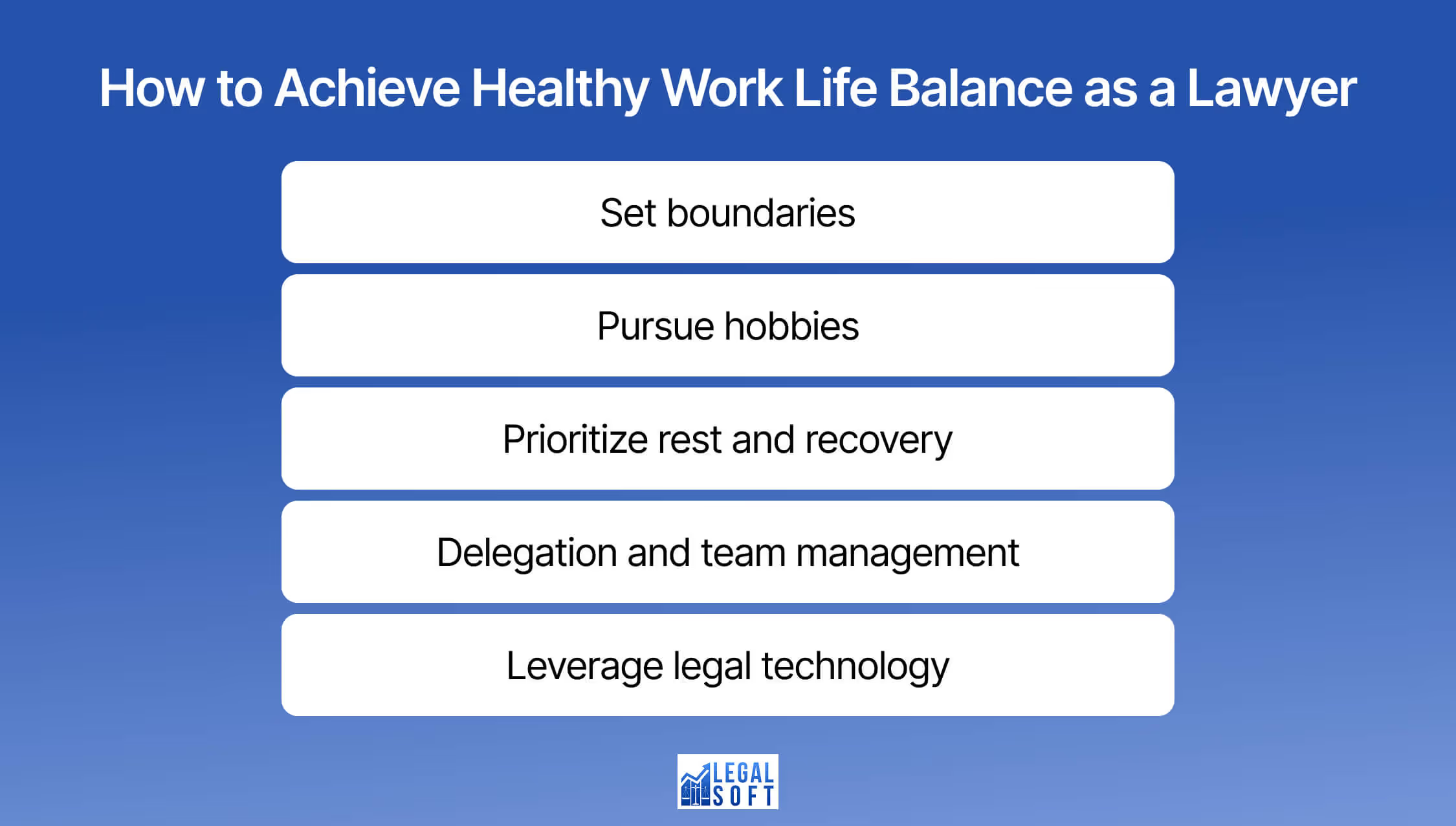
While the demands of law cannot be eliminated entirely, many attorneys manage their time and energy more effectively through the following approaches:
Set boundaries
Establishing clear boundaries around availability and response times helps prevent legal work from consuming every waking hour while often improving client relationships:
- Setting specific hours for checking email outside regular office hours
- Designating certain evenings or weekends as unavailable except for true emergencies
- Using separate phone numbers for legal work and personal calls
- Communicating clear expectations with clients about response times for non-urgent legal matters
These boundaries protect personal life while setting realistic expectations about availability for legal services.
Pursue hobbies
Engaging in activities outside of work, whether painting, cooking, or sports, provides much-needed mental restoration. A 2023 Harvard study found that creative and cognitively stimulating hobbies improve mental health and well-being.
Prioritize rest and recovery
Working long hours often tempts lawyers to sacrifice sleep, but quality rest is essential for both cognitive performance and physical health. Adequate sleep, regular breaks, and relaxation practices such as mindfulness or exercise can help sustain productivity and reduce burnout.
Delegation and team management
Task delegation represents one of the most powerful tools for managing lawyer workload and achieving better work life balance. Experienced lawyers increasingly rely on legal assistants, paralegals, and junior staff to handle routine billable tasks:
- Document preparation and formatting
- Initial legal research and fact-gathering
- Administrative work hours related to case management
- Routine client communication for legal matters
This approach allows senior lawyers to focus on high-value legal work while developing their team's capabilities and reducing their own hours spent on routine tasks.
Leverage legal technology
Modern legal software can significantly reduce the administrative burden that adds hours to lawyers' days, helping create better work life balance:
- Time tracking Software: Automated time tracking eliminates tedious manual time entry while ensuring accurate billing for billable hour requirements. These systems track time spent on emails, legal documents, and phone calls, automatically categorizing activities by client and matter.
- Document automation: Legal document automation tools reduce drafting time for routine legal documents, maintaining consistency while allowing customization for specific client needs.
- Client communication platforms: Dedicated client portals streamline communication through secure document sharing, case updates, and messaging systems, reducing time spent on phone calls and emails while improving client satisfaction.
Legal Career Paths with Better Work-Life Balance
Not all legal careers demand grueling hours or endless billable quotas. Many lawyers have found healthier schedules and greater long-term satisfaction by pursuing alternative career paths:
- Government Agencies: Offer predictable 40-hour workweeks, strong benefits, and job security. When the workday ends, lawyers can truly disconnect without worrying about billable hour targets.
- In-house counsel: Typically work regular business hours with occasional crunch periods. This path provides a balance between practicing law and contributing to business strategy.
- Public interest lawyers: Generally have lower compensation but offer mission-driven work, more sustainable schedules, and a supportive organizational culture.
- Solo practice: Gives lawyers full control over their schedules and client work. While the early years require initial effort to establish a practice, it often leads to greater flexibility once established.
- Contract and consulting legal work: Provides flexible, project-based roles, often with remote options. Attorneys can choose assignments that fit their schedule and interests while avoiding the politics of firm life.
The Future of Work-Life Balance for Lawyers
The legal profession is changing, slowly but surely. Several trends suggest that future lawyers might not have to choose between a successful legal career and having a personal life.
Technology transforming legal work
AI and automation handle increasingly routine legal work, from document review to basic contract analysis. As legal practice management software and AI tools become standard, they reduce the time pressure that drives crushing work schedules, potentially allowing lawyers to focus on higher-value tasks requiring human judgment.
New expectations for work-life balance
Gen Z lawyers are refusing to play by the old rules, showing a willingness to accept less compensation for better work-life balance. This generational shift is forcing even the most traditional firms to adapt. For example, almost half of younger lawyers would leave their current jobs for remote work options, according to a 2022 ABA survey.
When the talent pool demands a healthier work environment, firms must adapt by offering flexible schedules and remote options or risk losing good people.
Mental health awareness in legal services
The legal profession finally acknowledges what everyone already knew: traditional models are unsustainable. Bar associations, law school programs, and law firms recognize that lawyer well being isn't just nice-to-have—it's essential for providing quality legal services and maintaining a successful legal career.
This cultural shift happens gradually, but it's real. The next generation may actually achieve sustainable careers in the legal profession.
Final Notes
Most lawyers work significantly longer hours than professionals in other fields, often far beyond the traditional workweek. But not every lawyer must choose between a successful legal career and having a personal life outside legal work.
By understanding how many hours different practice settings require, recognizing the impact of billable hour requirements, and implementing effective time management strategies, you can create a more sustainable legal career. Many lawyers already prove that it’s possible to deliver excellent legal services while maintaining a healthier work-life balance.
Large firms often provide higher compensation but demand long hours and constant availability. By contrast, government agencies, public interest roles, or in-house counsel positions may offer lower pay but provide more predictable schedules and healthier boundaries. The key is selecting a career path that aligns with both your professional ambitions and personal values.
The legal profession is gradually figuring out that sustainable careers benefit everyone—lawyers, clients, and the communities legal professionals serve.
Sign up for free access to our platform and discover how our trained Virtual Legal Assistants can help you reduce hours and achieve better work-life balance—without sacrificing quality.
Frequently Asked Questions
How many hours do lawyers work a week?
The exact number of hours varies depending on factors like firm size, practice area, client demands, and billable hour requirements. On average, most lawyers work between 45 and 55 hours per week.
How many days do lawyers work a week?
Lawyers often work five or even six days a week. According to the 2022 Legal Trends Report, 74% of attorneys make themselves available on weekends to meet client demands.
Do lawyers work 9 to 5?
While some lawyers may keep a schedule close to traditional business hours, most routinely work extended hours, often starting between 8–9 a.m. and finishing around 5–6 p.m. The pressure of billable hour quotas and urgent client matters means many consistently work beyond the standard 9-to-5.
Sources and Data Verification
This guide draws from current industry data and reputable sources:
- Bloomberg Law 2024 Attorney Well-Being Report - Mental health and working hour statistics
- Clio’s Legal Trends Report 2024 and 2022 - Practice management and billing data
- NALP (National Association for Law Placement) - Associate working hours and billable requirements
- American Bar Association studies - Mental health and substance abuse statistics
- U.S. Bureau of Labor Statistics - Employment and wage data for legal professionals
- Indeed Career Research - Working hours by firm size and practice setting
Statistics were verified against multiple sources and updated to reflect 2022-2025 data where available.








